Some posts on this site contain affiliate links. If you book or buy something through these links, I earn a small commission (at no extra cost to you). Take a look at my privacy policy for more information.
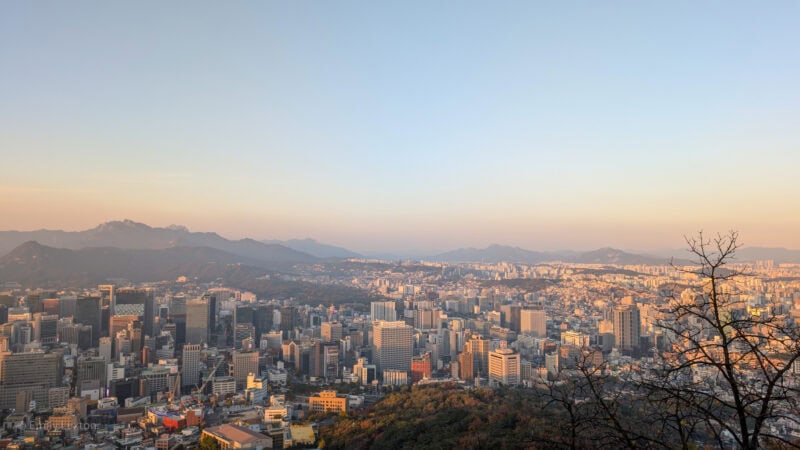
A guide to staying safe in South Korea for solo female travellers. Covering common crimes, getting around, and safety tips.
Even as a seasoned solo traveller, with over a decade of exploring the world alone under my belt, I was a bit nervous before I flew to South Korea for the first time.
That’s not because the country has a reputation for being dangerous, or because anyone had warned me about visiting (unlike when I travelled to India or Mexico solo!). It’s simply because I had no idea what to expect.
Very quickly after arriving, though, I discovered that my worries were completely unfounded. South Korea is by far the safest and easiest Asian country that I’ve visited on my own. Getting around was so simple (I’m still in awe of their public transportation system) and I never had any issues during my trip.
That said – there are still a few things for visitors to be aware of, so I’ve popped together a thorough safety guide for solo female travellers. If you have any questions at all, feel free to get in touch via the comments or on socials (I’m @em_luxton). Safe travels…
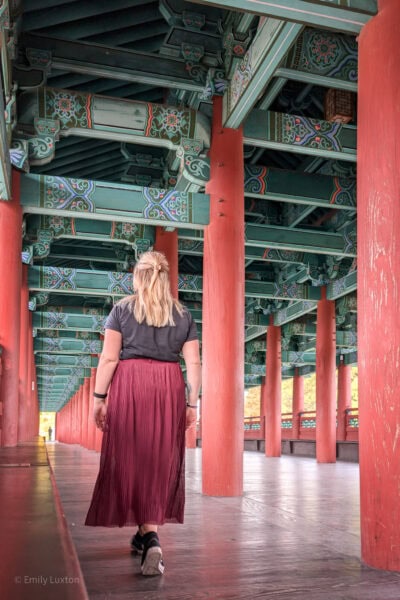
Is South Korea Safe for Solo Female Travellers?
The short answer is YES! Overall, South Korea is very safe for solo female travellers. In fact, Seoul (the capital) ranked in 25th place on the Economist’s Safe Cities Index in 2021 and 7th on the more recent 2025 State of Travel Insurance Safest Destinations report.
Crime rates are low, the public transportation system is consistently voted as one of the best in the world, and the country has a reputation for being very safe. However, there are a few things to be aware of, which I’ll outline below.
Common Crimes to be Aware Of
Crime levels are generally low in South Korea. According to data from Numbeo, Seoul has a low Crime Index score of 24.22, while Busan scores 22.97 – compare that with London’s 55.15! However, you should always remain as vigilant and safety-conscious as you would in any other country.
Petty Theft and Pickpocketing: It’s rare, but there have been reports of thefts, especially in crowded tourist areas such as Itaewon and Myeongdong in Seoul. Take extra care of passports, wallets, and valuables in crowded spots.
Assaults and Sexual Assaults: Again, reports of these are rare but there have been cases reported – often near bars and nightlife areas. As always, take care when travelling alone after dark – avoid walking late at night and stick to public transport or licenced taxis.
The emergency number in South Korea is 119 – or for the police, it’s 112.
Tourists can dial 1330 to reach the Korea Travel Helpline, who can provide you with an interpreter to speak to emergency services or connect you with the tourist police.
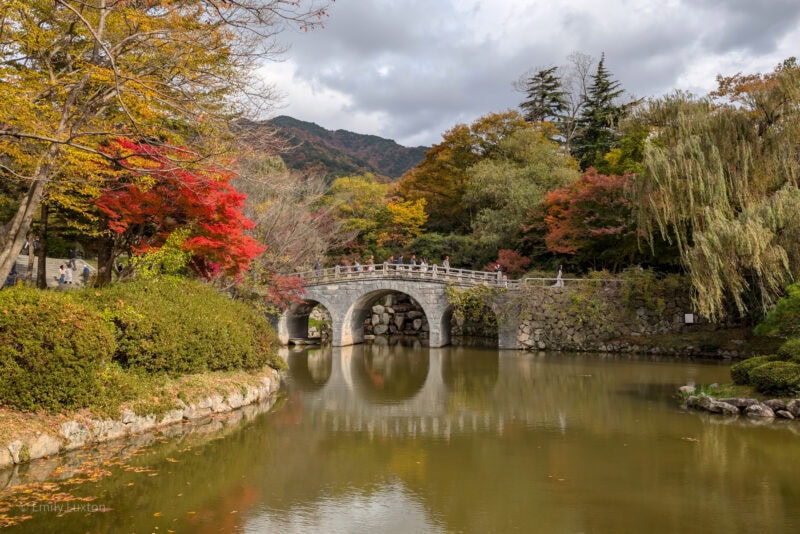
Political Situation
Terrorism: There’s been no recent history of terrorism in South Korea and it’s not considered a high-risk country.
Political Issues and Demonstrations: These are common in South Korea at the best of times, and even more so following recent political events (see below). These are mostly peaceful and have a strong police presence – but it’s a good idea to avoid any areas where public demonstrations are taking place. There were a couple of demonstrations while I was exploring South Korea, but they never impacted my travel at all.
Good to Know: In Korea, it’s illegal for foreign visitors to take part in political activities. So any demonstrations or protests are best avoided!
Recent Issues: In December 2024, South Korea’s president Yoon Suk Yeol was impeached following a short-lived attempt to instate Martial Law. At the time of writing (January 2025), this issue was still ongoing – with Yoon’s lawyers claiming his arrest warrant was illegal. Due to the heightened political tensions, protests are more common than usual – particularly around areas like the Constitutional Court or Gwanghwamun Square in Seoul. Keep an eye on the news, avoid protests, and follow any safety advice from the local authorities.
North Korea and the DMZ
Although the war has ended, there is an ongoing conflict between South and North Korea. An armistice agreement maintains peace, but there’s no formal peace treaty.
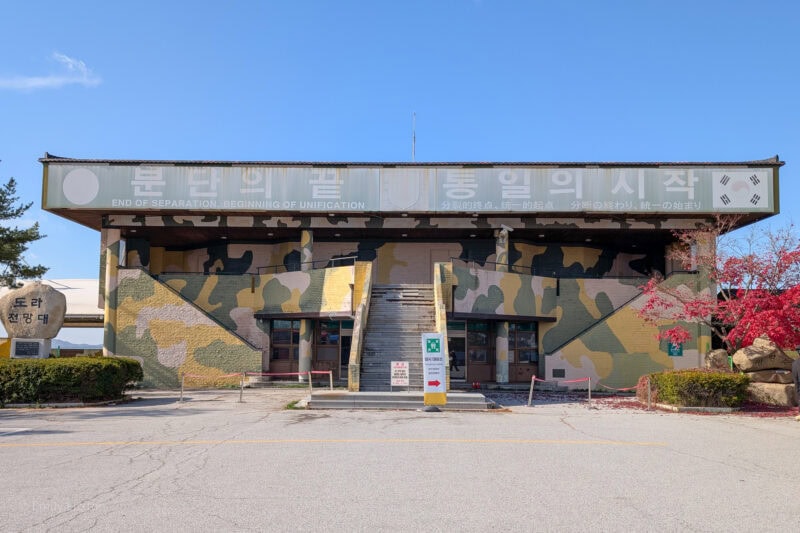
There have been a string of exchanges between the two countries, and tensions seem to be rising (for example, in October 2024, North Korea blew up sections of two roads that previously connected it with the South).
However, there’s no outright conflict and the political tensions between the two countries should have little impact on visitors. Just be aware of any updates when planning your trip.
Visiting the DMZ:
The two countries are separated by a demilitarised zone, known as the DMZ – which is a surprisingly popular tourist destination. There are a number of tours to visit the DMZ and various sites of note.
However, due to the increased tension in recent months, some parts of the tours have been cut off: you can no longer visit the observation deck on top of the Dora Observatory, and all tours to the JSA (where North and South Korean forces stand face-to-face) are currently suspended.
FYI: You can ONLY enter the DMZ as part of an official tour, and you need to bring your passport with you to cross the checkpoint.
Harassment
South Korea doesn’t have a reputation for being dangerous for women, and I didn’t experience any cat-calling or aggressive behaviour from men at all during my time there.
That said, these issues are unfortunately common the world over, and just like anywhere, some parts of larger cities and towns may be less safe after dark. It’s worth taking a few steps to stay safe:
- Avoid going to bars alone. Instead, see if your hostel is hosting any parties or consider joining a guided bar crawl – there are some great ones in Seoul on GetYourGuide (click here to view).
- Don’t walk alone in quiet areas or busy nightlife areas late at night.
- Avoid using unlicensed taxis. These are more common around nightlife areas late at night, when the demand is increased. They lack official registration and don’t use meters (read more here). Only use a taxi that has a meter – or stick to a ridesharing app like Uber, which has built-in security functions.
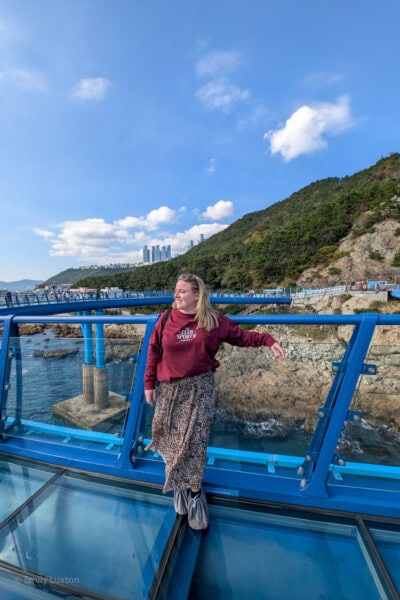
Health and Hygiene
Vaccinations: You don’t need any vaccinations to travel to South Korea – although it may be a good idea to top up your Covid and Flu vaccinations if you’re in a high-risk category. Always check the latest info on the NHS Fit to Travel site.
Malaria: South Korea is a “Low to No Risk” area for Malaria so antimalarials are not needed. However, you should still try avoid mosquito bites as these can also spread other diseases (like dengue fever) and are generally not much fun!
Water: Tap water is safe to drink across South Korea, although many locals still don’t use it due to lingering mistrust (which the government is campaigning to change). Public fountains are fairly common at tourist attractions, so take a refillable water bottle.
Top Tip: If you’re still unsure, a Water-to-Go bottle has a built-in filter to make sure water from any source is clean and safe. Read my review here for more info.
Getting Around South Korea Safely
Is public transport safe in South Korea?
The public transport system in South Korea is wonderful! It was one of my favourite things about the country: everything worked so efficiently and it was always straightforward to figure out where I was going.
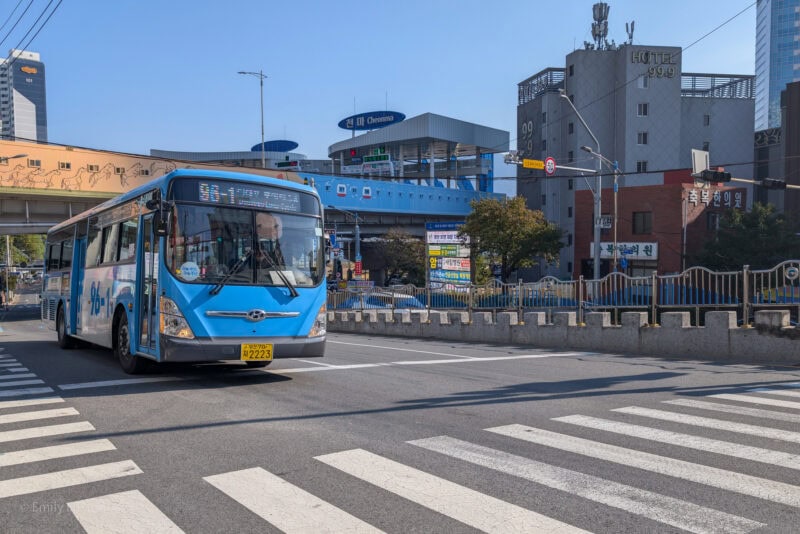
In major cities like Seoul and Busan, the subway systems are efficient, cheap, clean, and safe. There are also excellent bus networks in every city – and again, they’re very safe. And the whole country is linked by a fantastic system of trains and buses.
In fact, the trains are so safe in South Korea that they don’t check your ticket at any point, because no one ever boards a train without one!
Top Tip: Google Maps doesn’t work well in South Korea, so download the local app instead: Naver Maps. It’s so handy for planning journeys – and even pings you with a notification when it’s time to get off the underground! Download the app and set up an account before your trip for ease.
Is there Uber in South Korea?
Yes, there is Uber in South Korea – but usually only in major cities. It was definitely available in Seoul, Busan, and Gyeongju, but smaller towns and rural areas may not have Uber yet.
There is another app you can use called Kakao T (it used to be Kakao Taxi) which can be used to call local taxis. You need a Korean bank account to pay online, but you can also set it to pay directly to the driver (most accept both cash and credit cards). More info here.
Safety Tips for Solo Female Travellers in South Korea
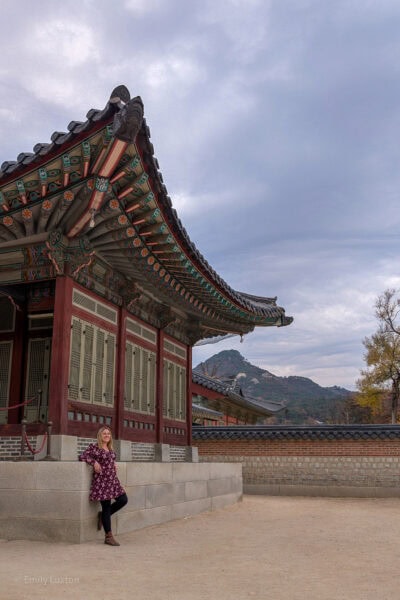
No matter which country you’re visiting, my advice to all solo female travellers is to remain vigilant, practice common sense, and avoid dangerous situations.
Learn the local emergency numbers
- Police: 112
- Fire & Ambulance: 119
Alternatively, you can contact the Korea Travel Helpline on 1330. They can provide interpretation services and connect you with the tourist police.
Have good travel insurance
I cannot stress enough the importance of travel insurance. If you encounter an issue – whether it’s a cancelled flight, stolen phone, or a medical emergency – you want that covered.
I recommend Safety Wing Travel Insurance. They have policies specifically for long-term travellers, digital nomads, and backpackers, and offer a really comprehensive cover for all trip types.
Get a Local SIM or eSIM
Internet access makes travelling in South Korea much easier. It’s also useful for safety as you’ll be able to use maps to get around, order Ubers, share your live location, or contact someone if you’re feeling uneasy.
You can buy a prepaid LG SIM card at Seoul airport, with prices starting from ₩6,500 (around £3.50 / $4.50) for 24 hours. A 10-day SIM card with unlimited data costs ₩35,000 (around £19 / $24).
An eSIM may work out cheaper (depending on the length of your trip). Even if not, it’s much more convenient, as you can install it straight onto your phone use it alongside your normal SIM – without needing to go into a shop.
Airalo: From £26.50 / $32 (unlimited data, 10 days). Use code EMILY9237 to get £2.50 / $3 off your first purchase.
Nomad: From £4.50 / $5 (1GB, 7 days). Use code EMIL96SV to get $7 off your first purchase.
More safety tips for female travellers
- Avoid sharing your live location on social media: post things like Instagram stories at the end of the day.
- Don’t meet up with anyone you don’t know.
- If you want to use dating apps or join a meetup event, I highly recommend doing it in a public place and arranging check-in times with a trusted friend back home.
- Avoid unlicensed taxis. Use Uber to order cabs, or get someone at your accommodation/restaurant to call one for you. Turn on location sharing via WhatsApp if you’re ever concerned.
- Use reputable providers for tours and excursions. I recommend using Get Your Guide to find tours – they have a great range and use verified reviews, so you can make sure the tour you’re booking has a good reputation.
- Avoid walking alone late at night – especially in quieter areas or busy nightlife areas. A taxi from door to door is usually the safest option.
Quick Summary
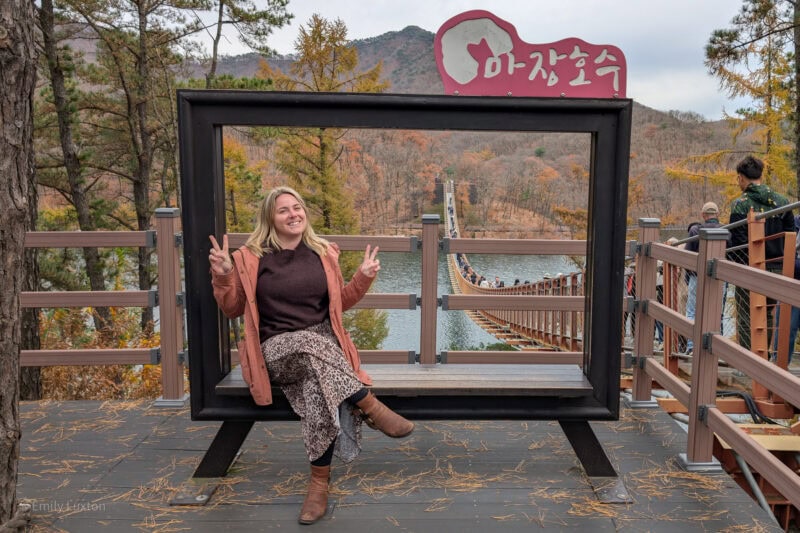
On the whole, South Korea is a very safe destination for solo female travellers. Crime rates are very low, public transportation is excellent, and there’s a fantastic infrastructure for tourism across the country.
Here’s a quick summary of the tips I shared above:
- Get a local pre-paid SIM or eSIM so that you can use maps, translations, and call Ubers.
- Learn the local emergency number (112 for police and 119 for ambulance/fire).
- Have good travel insurance.
- Remain careful of your valuables, even though theft is uncommon.
As long as you make sensible choices, take the right precautions, and use your common sense, you should be perfectly safe travelling alone in Korea. I hope you have a great trip!
Got a question about solo female travel in South Korea? Scroll down to leave a comment and I’ll try to help!
Solo Female Travel Resources
Airalo – Buy a pre-paid eSIM for your destination to get online without roaming fees. Use code EMILY9237 to get £2.50 off your first purchase.
UK Government’s Travel Advice – All the most up-to-date advice about entry requirements and visas for all destinations (for British citizens).
Fit For Travel – The NHS travel advice site. Search by destination to see what vaccinations are needed and check for any health issues you need to be aware of.
Safety Wing Travel Insurance – The best insurance for long-term travellers, digital nomads, and backpackers.
Hostelworld – The best place to search for hostels & budget accommodation.
Booking.com – The best booking site for all types of accommodation. It usually has the lowest prices and the widest range.
Get Your Guide – My favourite website for booking tours. It has a fantastic range of options all over the world.
Discover Cars – Easily search for and book car hire around the world. Includes ratings/reviews for each car hire company.
XE Currency App – Simple currency conversions (works offline once synced) Apple | Android
Maps.Me – Similar to Google Maps, except it works offline (once you’ve downloaded the map). Apple | Android
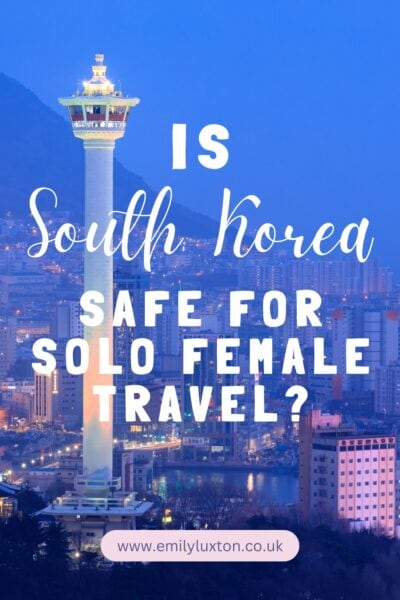
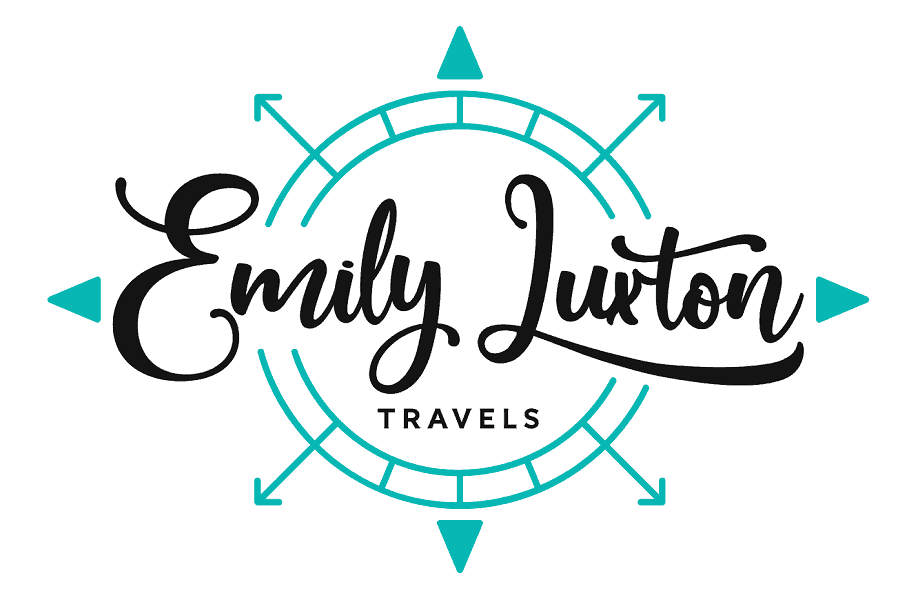
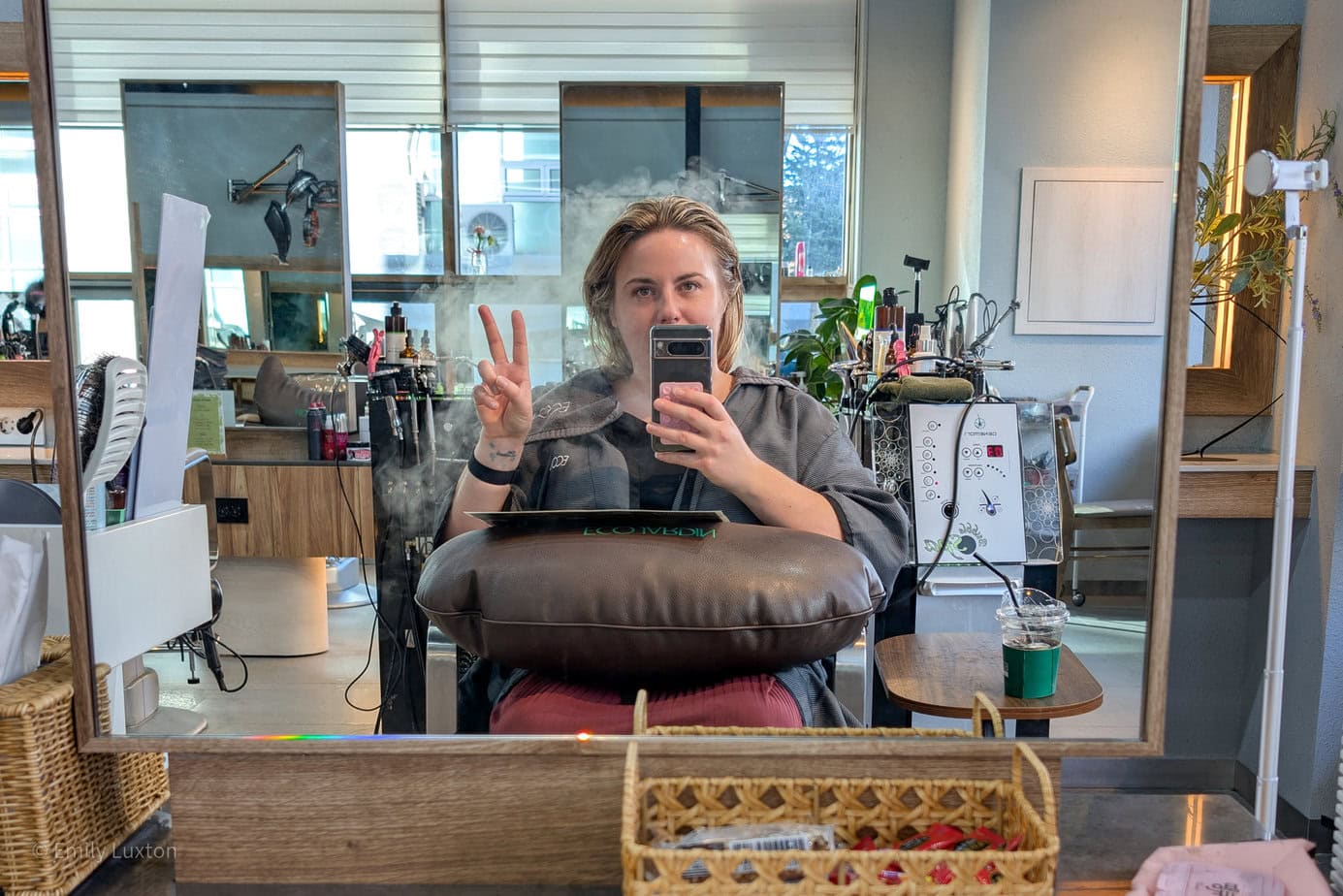


Hi Emily,
I am from India turning 25 this year i want to visit south korea in April as its my Birthday month and i want to know if i should travel right now or not as i recently heard the political & climate crisis going on, its my dream to visit but this is my first time literally ever getting out of my house & literally travelling anywhere solo.
Please let me know i am waiting for you, Thanks.
Hi Pranjal! There is some political upheaval right now due to the president being removed from office. There will probably be protests but in my experience these are usually organised in advance with warning and held in specific locations, so they are easy to avoid. To be honest public demonstrations are fairly common at all times, and ae usually well organised and without incident (although it’s still best to avoid them). As far as I can see there are no warnings against travelling to South Korea due to these tensions.
This is what the UK government haved said:
“Large protests may continue following the Constitutional Court’s decision on Friday 4 April to remove President Yoon from office. Protests are particularly likely in the following areas of Seoul:
Around the Constitutional Court (near Anguk station)
Gwanghwamun Square and Sejong-daero, particularly between the City Hall/Deoksugung area and Gyeongbokgung
Around the Presidential Residence (in Hannam-dong)
Around the National Assembly (in Yeouido)
Protests may also occur in other locations, including in other cities around South Korea.
You should follow the advice of local authorities and avoid large public gatherings. Be aware that under Korean law, it is illegal for foreign nationals to take part in political activities when in the country.”
The UK Government’s travel advice page is usually quite good for up-to-date warnings: https://www.gov.uk/foreign-travel-advice/south-korea